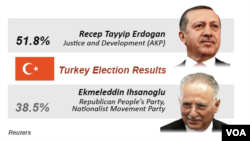With Recep Tayyip Erdogan elected president, his first challenge is finding a successor for the office of prime minister and a leader for his political party, AKP. While he says he wants to maximize the power of the presidency, the real power still remains in parliament.
With a general election due in less than a year, finding a leader that can keep his party united -- while at the same time is loyal enough to maintain his power -- is seen as a key challenge facing Erdogan.
His supporters celebrated into the early morning after Erdogan was elected Turkey’s 12th president.
While he scored a first-round victory with an absolute majority of the voters, analyst Sinan Ulgen of the Carnegie Institute in Brussels said the new president has a pressing problem.
According to the Turkish constitution, the main executive power is held by the prime minister and not the president, according to Ulgen. It is clear Erdogan will want to introduce a de-facto executive presidency, but that is going to be difficult given Turkish constitutional order. So the name that will replace Erdogan as the next prime minister of the country, will also be extremely important.
AK Party decisions
Although his AK Party dominates parliament, choosing a successor may not be easy. Ulgen said the new prime minister will have to be a skilled politician.
"The next prime minister will have to do a very complicated act of political balancing. On the one hand, he will have to impose his authority over the party. He will need to have to establish a sense of balance with the president-elect. And he will have to take his party to the parliamentary elections in 2015," he said.
Another factor, which Erdogan is expected weigh when choosing a new prime minister, will be the ability of his successor to hold the ruling AK Party together.
The party is made up of wide-ranging and often conflicting factions. Analysts say Erdogan’s biggest achievement as prime minister was his ability to keep the party united.
Possible successors
Opponents fear an increasingly authoritarian state. Erdogan chaired a meeting Monday of the party's highest decision-making board, the first step in a process that will culminate with the naming of his replacement as prime minister once he is inaugurated as president on August 28.
Party spokesman Huseyin Celik said the AK Party will hold an extraordinary convention on August 27, at which it will select a new party leader, a figure Erdogan is then expected to ask to form a new government.
Senior AK officials say Foreign Minister Ahmet Davutoglu, who has strong support within the party bureaucracy and has been Erdogan's right-hand man internationally, is the top choice to succeed him, although former transport minister Binali Yildirimis also is trying to position himself for the job.
President Abdullah Gul, long seen as a potential future prime minister, on Monday signaled a return to politics after his term expires on August 28, saying he would play a role in the ruling AK Party he co-founded with Erdogan. Gul could not become prime minister immediately as he is not currently a member of parliament, although his role could change after parliamentary elections due in 2015.
General elections
Next year, Turkey holds general elections. Political columnist Asli Aydintasbas of the Turkish newspaper Milliyet, said the outcome of those polls will be crucial to Erdogan’s ambitions.
"Erdogan will not be the head of the party so the party will go into election without an extremely charismatic figurehead," he said. "They will actually be fighting their own battles. And on top of it, if they don't raise their votes, they will fall short of the number in parliament they need to change the constitution. So who heads the party for 2015 is extremely important."
Turkey’s recent political history is littered with powerful political leaders who, after becoming president, have seen their powers whither.
If Erdogan is able to orchestrate the appointment of a malleable interim prime minister, he is expected to influence decisions and continue to run the government until he fulfills his long-term ambition of replacing the parliamentary system with a presidential one. This makes his choice of successor one of the most important decisions he will have to make in his new role.
Reuters information contributed to this report.










